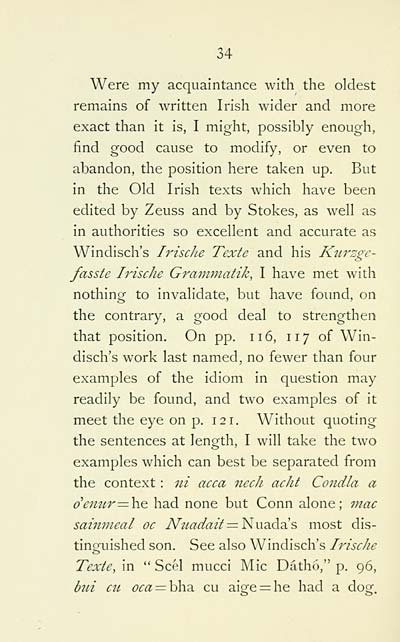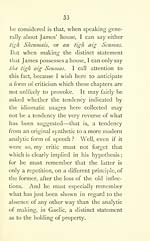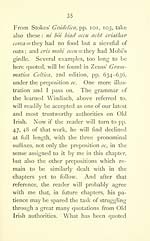Blair Collection > Vestigia celtica
(38)
Download files
Complete book:
Individual page:
Thumbnail gallery: Grid view | List view

34
Were my acquaintance with the oldest
remains of written Irish wider and more
exact than it is, I might, possibly enough,
find good cause to modify, or even to
abandon, the position here taken up. But
in the Old Irish texts which have been
edited by Zeuss and by Stokes, as well as
in authorities so excellent and accurate as
Windisch's Irische Texte and his Kurzgc-
fasste Irische Grammatik, I have met with
nothing to invalidate, but have found, on
the contrary, a good deal to strengthen
that position. On pp. ii6, 117 of Win-
disch's work last named, no fewer than four
examples of the idiom in question may
readily be found, and two examples of it
meet the eye on p. 121. Without quoting
the sentences at length, I will take the two
examples which can best be separated from
the context : ni acca nccJi acht Condla a
o'eiittr=\\& had none but Conn alone; vmc
sainmeal oc JViiadai^ =Nua.d3!s most dis-
tinguished son. See also Windisch's Irische
Texte, m "Seel mucci Mic Datho," p. 96,
btd cii oca — h\\'^i cu ai2re = he had a doQf
Were my acquaintance with the oldest
remains of written Irish wider and more
exact than it is, I might, possibly enough,
find good cause to modify, or even to
abandon, the position here taken up. But
in the Old Irish texts which have been
edited by Zeuss and by Stokes, as well as
in authorities so excellent and accurate as
Windisch's Irische Texte and his Kurzgc-
fasste Irische Grammatik, I have met with
nothing to invalidate, but have found, on
the contrary, a good deal to strengthen
that position. On pp. ii6, 117 of Win-
disch's work last named, no fewer than four
examples of the idiom in question may
readily be found, and two examples of it
meet the eye on p. 121. Without quoting
the sentences at length, I will take the two
examples which can best be separated from
the context : ni acca nccJi acht Condla a
o'eiittr=\\& had none but Conn alone; vmc
sainmeal oc JViiadai^ =Nua.d3!s most dis-
tinguished son. See also Windisch's Irische
Texte, m "Seel mucci Mic Datho," p. 96,
btd cii oca — h\\'^i cu ai2re = he had a doQf
Set display mode to: Large image | Transcription
Images and transcriptions on this page, including medium image downloads, may be used under the Creative Commons Attribution 4.0 International Licence unless otherwise stated. ![]()
| Early Gaelic Book Collections > Blair Collection > Vestigia celtica > (38) |
|---|
| Permanent URL | https://digital.nls.uk/75800833 |
|---|
| Description | Celtic footprints in philology ethics and religion. |
|---|---|
| Shelfmark | Blair.1 |
| Additional NLS resources: | |
| Attribution and copyright: |
|
| Description | A selection of books from a collection of more than 500 titles, mostly on religious and literary topics. Also includes some material dealing with other Celtic languages and societies. Collection created towards the end of the 19th century by Lady Evelyn Stewart Murray. |
|---|
| Description | Selected items from five 'Special and Named Printed Collections'. Includes books in Gaelic and other Celtic languages, works about the Gaels, their languages, literature, culture and history. |
|---|

